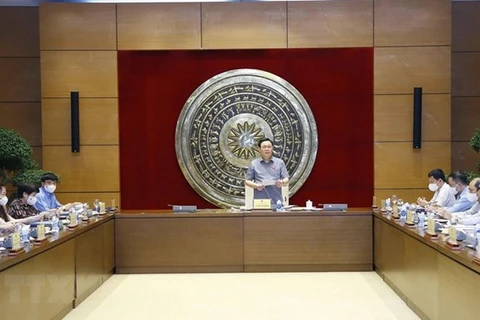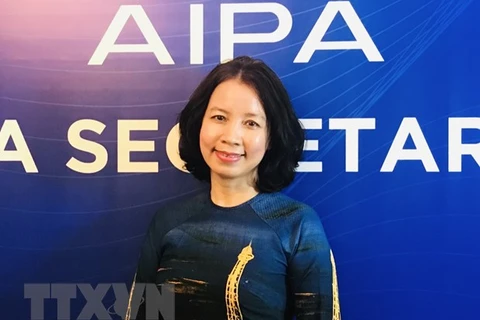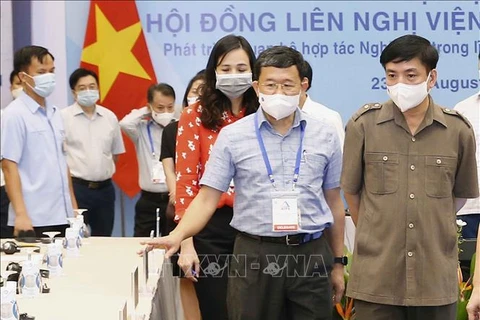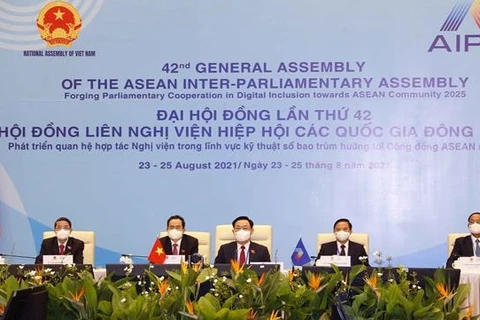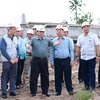Hanoi (VNA) – Chairman of the National Assembly of Vietnam Vuong Dinh Hue on August 23 delivered a speech at the first plenary session of the 42nd General Assembly of the ASEAN Inter-Parliamentary Assembly (AIPA-42) via videoconference.
Under the themed “Forging parliamentary cooperation in digital inclusion towars ASEAN Community 2025”, the 42nd AIPA General Assembly is held by Brunei from August 23-25.
Following is the full text of Hue’s remarks.
Excellency Pehin Dato Abdul Rahman Taib, Speaker of the Legislative Council of Brunei Darussalam, President of AIPA 42,
Excellencies Speakers and Heads of Delegation of AIPA Member and Observer Parliaments,
Esteemed delegates,
On behalf of the Vietnamese National Assembly, allow me to extend my warmest greetings to Excellencies President of AIPA 42, AIPA Parliamentary leaders, Observer Parliaments, the AIPA Secretary General, ASEAN Secretary General and delegates attending the 42nd AIPA General Assembly. In celebration of the Islamic New Year, may I also convey my best wishes to Excellency President of AIPA 42, Negara Brunei Darussalam, and Muslim friends in ASEAN. I would like to thank the Legislative Council of Brunei Darussalam for its efforts and active preparations to make this event happen via videoconference.
Ladies and gentlemen,
In the past year, the world and the ASEAN region continued to face tremendous difficulties and challenges posed by the COVID-19 pandemic, causing casualties and disruptions of the regional supply chain. This has significantly impacted economic growth and exacerbated social inequality, including digital inequality and social welfare. More than ever, the COVID-19 pandemic has underscored the urgency across the board pertaining to state governance, and adjustments of policies and development goals. It has also emphasised the demand for digitalization and the building of a digital economy, so as to timely respond to the pandemic and sustain socio-economic development.
Despite the effects of the ongoing COVID-19 pandemic and the complex, unpredictable shifts in the regional and international geo-political landscape, we are delighted to note that the ASEAN Community has continued to maintain solidarity, unity and self-reliance, and uphold its stern resolve and centrality. Our Community has timely exerted collective efforts in response to the pandemic since its outbreak. As we weather tempestuous challenges, the close bonds and mutual sharing among ASEAN members and their peoples are further bolstered. Via such initiatives as the ASEAN COVID-19 Response Fund, the Regional Reserve of Medical Supplies, the Standard Operating Procedures for public health emergencies, and particularly the ASEAN Vaccine Security and Self-Reliance initiative, ASEAN members have worked closely together to strengthen the responsiveness of each country and gradually contain the pandemic. Given a comprehensive approach conducted in tandem with efforts to combat this pandemic, ASEAN is expediting the implementation of measures under the ASEAN Comprehensive Recovery Framework, in which innovation, digitalisation, and the transformation of growth models are considered as drivers to promptly foster sustainable recovery.
The COVID-19 pandemic also constitutes a catalyst for ASEAN’s endeavors to accelerate the digitalization of its economy, effectively harness the 4th Industrial Revolution Revolution, narrow the digital gap, and ensure digital equality in the region. I highly commend the 1st ASEAN Digital Ministers’ Meeting in January 2021 for approving the ASEAN Digital Masterplan 2025. I also support the efforts to adopt and implement ASEAN’s Consolidated Strategy on the 4th Industrial Revolution. Such endeavors would serve to create an innovative ASEAN Community and enhance ASEAN’s competitiveness in the global economy.
Ladies and gentlemen,
The theme “Forging Parliamentary Cooperation in Digital Inclusion towards ASEAN Community 2025” outlines the need to further build on the vital role of AIPA and its Member Parliaments in accelerating digitalisation, ensuring stable growth and fostering sustainable recovery of ASEAN, thereby maintaining ASEAN’s key contributions to regional peace, stability and prosperity. With this in mind, I would like to draw your attention to the following proposals:
First, AIPA Member Parliaments need to complete the legal framework and remove barriers to facilitate the implementation of digital transformation policies, with a view to building the e-Government towards a digital government. It is also necessary to improve the quality of online public services of our Governments and Parliaments, facilitate equitable access to digital services for the people and businesses, increase digital literacy for the vulnerable groups, offer fair, equitable and affordable digital services, and promote the development of a digital economy and society.
Second, we need to encourage the Governments of ASEAN members to carry out concrete programs, action plans and strategies pertaining to digital development. It is also essential to bolster cooperation with partners and international organizations to improve digital infrastructure, ensure an inclusive digital ecosystem, and narrow the digital gap. I wish to underscore the importance of strengthening digital connectivity and narrowing the digital gap among countries and regions to ensure equitable and sustainable development in ASEAN. I kindly request AIPA to actively lend its assistance to the Governments of ASEAN countries in accelerating the implementation of measures to boost digital connectivity and digital literacy in less-developed areas, including sub-regions in ASEAN, under the Master Plan for ASEAN Connectivity 2025 and the Initiative for ASEAN Integration (IAI) Work Plan IV.
Third, we need to mobilise social resources to develop a digital ecosystem via public - private partnership and create incubators to develop digital corporations and start-ups. In particular, it is necessary to align the ASEAN Comprehensive Recovery Framework with the plans of each country to assist their enterprises in enhancing innovation and expediting digitalisation, thereby allowing them to ensure stability and resume production and business activities.
Fourth, we need to improve policies and legal frameworks and support initiatives in the cooperation within ASEAN and between ASEAN and its partners on cyber security, information privacy, data protection and confidence building in the digital sphere. An advanced digital infrastructure and necessary confidence in this field will pave the way for the quick and sustainable development of ASEAN countries.
Ladies and gentlemen,
All efforts to foster national recovery and development can only be conducted in a region of peace, security and stability. I welcome and highly appreciate the endeavors of the Governments of ASEAN members, and the active support of AIPA Member Parliaments in maintaining and promoting dialogue, cooperation and confidence building, upholding the respect for international law, and preventing and reducing risks to stability. These measures would be important contributors to enduring peace, security and stability in the region.
Your Excellency,
Ladies and gentlemen,
This year, despite numerous challenges caused by COVID-19, in May, Vietnam successfully held the elections for the 15th National Assembly, and the People’s Councils at all levels for the 2021-2026 tenure. In July, Vietnam successfully convened the first session of the 15th National Assembly to elect the key leaderships of the State, National Assembly and Government, and outline the goals to become a modernity-oriented industrialized developing country, having graduated from the lower-middle income group by 2025, a developing country with a modern industrial base and an upper-middle income by 2030, and a developed, high-income country by 2045. The National Assembly of Vietnam pledges to continue being an active and responsible AIPA member, for the development of parliamentary diplomacy and the interests of all people in ASEAN.
On this occasion, I would like to wish Your Excellency Mr. President and all of you good health and success in your noble missions, as you work alongside Governments and the peoples to overcome current challenges to build a united, strong and prosperous ASEAN Community.
I am confident that, under your presidency and with the active participation of all delegates, the 42nd AIPA General Assembly will be crown with great success.
Thank you./.
Under the themed “Forging parliamentary cooperation in digital inclusion towars ASEAN Community 2025”, the 42nd AIPA General Assembly is held by Brunei from August 23-25.
Following is the full text of Hue’s remarks.
Excellency Pehin Dato Abdul Rahman Taib, Speaker of the Legislative Council of Brunei Darussalam, President of AIPA 42,
Excellencies Speakers and Heads of Delegation of AIPA Member and Observer Parliaments,
Esteemed delegates,
On behalf of the Vietnamese National Assembly, allow me to extend my warmest greetings to Excellencies President of AIPA 42, AIPA Parliamentary leaders, Observer Parliaments, the AIPA Secretary General, ASEAN Secretary General and delegates attending the 42nd AIPA General Assembly. In celebration of the Islamic New Year, may I also convey my best wishes to Excellency President of AIPA 42, Negara Brunei Darussalam, and Muslim friends in ASEAN. I would like to thank the Legislative Council of Brunei Darussalam for its efforts and active preparations to make this event happen via videoconference.
Ladies and gentlemen,
In the past year, the world and the ASEAN region continued to face tremendous difficulties and challenges posed by the COVID-19 pandemic, causing casualties and disruptions of the regional supply chain. This has significantly impacted economic growth and exacerbated social inequality, including digital inequality and social welfare. More than ever, the COVID-19 pandemic has underscored the urgency across the board pertaining to state governance, and adjustments of policies and development goals. It has also emphasised the demand for digitalization and the building of a digital economy, so as to timely respond to the pandemic and sustain socio-economic development.
Despite the effects of the ongoing COVID-19 pandemic and the complex, unpredictable shifts in the regional and international geo-political landscape, we are delighted to note that the ASEAN Community has continued to maintain solidarity, unity and self-reliance, and uphold its stern resolve and centrality. Our Community has timely exerted collective efforts in response to the pandemic since its outbreak. As we weather tempestuous challenges, the close bonds and mutual sharing among ASEAN members and their peoples are further bolstered. Via such initiatives as the ASEAN COVID-19 Response Fund, the Regional Reserve of Medical Supplies, the Standard Operating Procedures for public health emergencies, and particularly the ASEAN Vaccine Security and Self-Reliance initiative, ASEAN members have worked closely together to strengthen the responsiveness of each country and gradually contain the pandemic. Given a comprehensive approach conducted in tandem with efforts to combat this pandemic, ASEAN is expediting the implementation of measures under the ASEAN Comprehensive Recovery Framework, in which innovation, digitalisation, and the transformation of growth models are considered as drivers to promptly foster sustainable recovery.
The COVID-19 pandemic also constitutes a catalyst for ASEAN’s endeavors to accelerate the digitalization of its economy, effectively harness the 4th Industrial Revolution Revolution, narrow the digital gap, and ensure digital equality in the region. I highly commend the 1st ASEAN Digital Ministers’ Meeting in January 2021 for approving the ASEAN Digital Masterplan 2025. I also support the efforts to adopt and implement ASEAN’s Consolidated Strategy on the 4th Industrial Revolution. Such endeavors would serve to create an innovative ASEAN Community and enhance ASEAN’s competitiveness in the global economy.
Ladies and gentlemen,
The theme “Forging Parliamentary Cooperation in Digital Inclusion towards ASEAN Community 2025” outlines the need to further build on the vital role of AIPA and its Member Parliaments in accelerating digitalisation, ensuring stable growth and fostering sustainable recovery of ASEAN, thereby maintaining ASEAN’s key contributions to regional peace, stability and prosperity. With this in mind, I would like to draw your attention to the following proposals:
First, AIPA Member Parliaments need to complete the legal framework and remove barriers to facilitate the implementation of digital transformation policies, with a view to building the e-Government towards a digital government. It is also necessary to improve the quality of online public services of our Governments and Parliaments, facilitate equitable access to digital services for the people and businesses, increase digital literacy for the vulnerable groups, offer fair, equitable and affordable digital services, and promote the development of a digital economy and society.
Second, we need to encourage the Governments of ASEAN members to carry out concrete programs, action plans and strategies pertaining to digital development. It is also essential to bolster cooperation with partners and international organizations to improve digital infrastructure, ensure an inclusive digital ecosystem, and narrow the digital gap. I wish to underscore the importance of strengthening digital connectivity and narrowing the digital gap among countries and regions to ensure equitable and sustainable development in ASEAN. I kindly request AIPA to actively lend its assistance to the Governments of ASEAN countries in accelerating the implementation of measures to boost digital connectivity and digital literacy in less-developed areas, including sub-regions in ASEAN, under the Master Plan for ASEAN Connectivity 2025 and the Initiative for ASEAN Integration (IAI) Work Plan IV.
Third, we need to mobilise social resources to develop a digital ecosystem via public - private partnership and create incubators to develop digital corporations and start-ups. In particular, it is necessary to align the ASEAN Comprehensive Recovery Framework with the plans of each country to assist their enterprises in enhancing innovation and expediting digitalisation, thereby allowing them to ensure stability and resume production and business activities.
Fourth, we need to improve policies and legal frameworks and support initiatives in the cooperation within ASEAN and between ASEAN and its partners on cyber security, information privacy, data protection and confidence building in the digital sphere. An advanced digital infrastructure and necessary confidence in this field will pave the way for the quick and sustainable development of ASEAN countries.
Ladies and gentlemen,
All efforts to foster national recovery and development can only be conducted in a region of peace, security and stability. I welcome and highly appreciate the endeavors of the Governments of ASEAN members, and the active support of AIPA Member Parliaments in maintaining and promoting dialogue, cooperation and confidence building, upholding the respect for international law, and preventing and reducing risks to stability. These measures would be important contributors to enduring peace, security and stability in the region.
Your Excellency,
Ladies and gentlemen,
This year, despite numerous challenges caused by COVID-19, in May, Vietnam successfully held the elections for the 15th National Assembly, and the People’s Councils at all levels for the 2021-2026 tenure. In July, Vietnam successfully convened the first session of the 15th National Assembly to elect the key leaderships of the State, National Assembly and Government, and outline the goals to become a modernity-oriented industrialized developing country, having graduated from the lower-middle income group by 2025, a developing country with a modern industrial base and an upper-middle income by 2030, and a developed, high-income country by 2045. The National Assembly of Vietnam pledges to continue being an active and responsible AIPA member, for the development of parliamentary diplomacy and the interests of all people in ASEAN.
On this occasion, I would like to wish Your Excellency Mr. President and all of you good health and success in your noble missions, as you work alongside Governments and the peoples to overcome current challenges to build a united, strong and prosperous ASEAN Community.
I am confident that, under your presidency and with the active participation of all delegates, the 42nd AIPA General Assembly will be crown with great success.
Thank you./.
VNA

